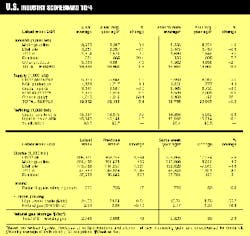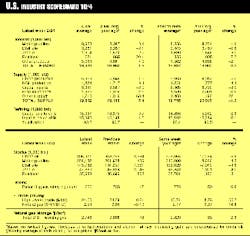OGJ Newsletter
Progress in Latin America's petroleum sector has taken two steps forward and one backward.
Brazil will be one of the most sizzling hot spots for exploration in the coming decade. Underscoring that prediction-and an end to the upstream monopoly of state oil company Petrobras-was the official award of 12 blocks to multinational firms last week. State petroleum agency ANP signed agreements last week with Royal Dutch/Shell, Exxon, BP Amoco, Texaco, Unocal, Repsol-YPF, Agip, Amerada Hess, and British Borneo-and Petrobras-that cover licenses awarded under Brazil's first licensing round (OGJ, June 28, 1999, p. 31).
ANP says these first contracts, for which bidders offered $180 million in initial work bids, are expected to result in exploration outlays totaling $600 million over the next 9 years. Minimum work bid under the contracts covers 43,000 km of 2D and 3D seismic and 58 wells. A second exploration round is scheduled for early 2000. This initiative stands apart from joint venture agreements between Petrobras and a number of foreign firms covering E&D work on acreage reserved for Petrobras under Brazil's petroleum demonopolization law.
Energy-related JVs are also on tap for the state oil firms of Venezuela and Colombia-akin to the one established between Pdvsa and Petrobras. Pdvsa and Ecopetrol are looking at a range of possible JVs in E&P and refining-marketing and the feasibility of connecting the countries' gas pipeline grids. Both nations have undertaken ambitious initiatives recently on expanding their gas industry infrastructures, marked by the publication late last month of a new gas law in Venezuela that is the centerpiece of the new government's push to lure foreign investment to its petroleum sector. On tap are possible JVs involving Pdvsa's trademark heavy crude-based boiler fuel Orimulsion to generate electricity in Colombia and a program of petroleum technology transfer and training, as well as a mutual effort to end illegal trade of gasoline at the border between the nations.
On the downside, the deadline for tenders for Peru's Camisea natural gas megaproject has been postponed yet again. Peru postponed by 1 month deadlines for Camisea tenders, which now won't be defined until Jan. 21, 2000. The original deadline was Nov. 24, although this was later extended to Dec. 21. Peru President Alberto Fujimori says the government will take all the time that is needed, if further adjustments to the project are required.
The Camisea committee is calling for bids for a contract to develop and produce Camisea's reserves, estimated at 13 tcf of gas and 600 million bbl of liquids. It is also offering two concessions of 20-60 years to transport and distribute the gas and liquids. The new deadline for presenting offers for the transportation-distribution concessions is Dec. 14, and the committee will announce results Dec. 17. Bidders for developing the gas fields will present their offers Jan. 18, and the committee will announce results Jan. 21. The deadlines could reportedly be extended for another month, if necessary, although this could cause complications as the date draws nearer to general elections in April 2000.
The extension coincided with the resignation of Energy and Mines Minister Daniel Hokama amid speculation over disputes within the Camisea committee. Fujimori and committee members, however, deny any connection.
Two qualifying bidders-TransCanada for the transportation-distribution concessions and TotalFina for the development contract-had both said more time is needed. Although the government last month published detailed regulations to be applied to gas projects-including regulated tariffs-it has yet to announce other key factors, such as price caps at the wellhead and the guaranteed market for producers (OGJ, Sept. 27, 1999, p. 30).
The European Commission has approved the industry's two largest planned mergers-Exxon-Mobil and BP Amoco-ARCO-on the condition, in both cases, that certain divestitures are made. The EC released a statement saying, "The supermajors will still be facing competition from smaller oil companies. And countries on whose territory oil and gas is found have no incentives to let oil companies restrict production."
The EC called for the breakup of the European refining and marketing joint venture of BP Amoco and Mobil as a precondition for approval of the Exxon-Mobil merger. BP Amoco is reportedly keen to buy the Mobil stake, which was valued at about £1 billion. Mobil apparently wanted to maintain its relationship with BP Amoco, but EC officials feared that the recent rash of megamergers could kill off downstream competition in member countries.
Meanwhile, the EC has rubber-stamped BP Amoco's absorption of ARCO, providing the two firms sell off some interests in a number of natural gas export pipelines in the southern UK North Sea.
EC insisted that the combine should sell off ARCO's share in the Thames, Hewett, and Caister-Murdoch pipelines, along with its stake in the gas processing terminal at Bacton.
BP Amoco CEO John Browne said, "In the past few weeks, shareholders of both companies have given overwhelming support to the (merger). We continue our constructive dialogue with the US authorities and remain confident that we can meet our target of completion of the deal before the end of the year."
Struggling London independent Premier Oil is "at an advanced stage of discussion" with Amerada Hess and Malaysian state oil firm Petronas over an equity divestiture. The proposal would grant Amerada Hess-which already owns 25% of Premier-and Petronas each a 25% stake. Premier was hit hard by the recent oil price collapse but expects a return to profitability when two Far East gas projects begin producing: Thailand's Yetagun field, due on stream in 2000 (OGJ, Mar. 1, 1999, p. 42), and West Natuna Sea Block A production, sales from which are slated to begin in 2001 (see related story, p. 38).
Premier CEO Charles Jamieson said the cash injection would "immediately strengthen our financial position...Strategically, through our relationship with Amerada Hess and Petronas, we will be positioned to be a focused Asian gas player with a unique competitive advantage in (that) market."
Protesters demanding employment raided Nigeria LNG's new $3.8 billion Bonny, Rivers state, gas liquefaction plant, forcing its shutdown.
As OGJ went to press, NLNG declared it would not make its first shipment on Oct. 1 as planned. The plant began producing 6,000 tonnes/day of LNG on Sept. 25 in readiness for the first cargo, which was due to arrive in France on Oct. 27 (OGJ, Sept. 27, 1999, p. 32). Soon after the plant started up, however, about 5,000 youths invaded it, and staff had to be evacuated by helicopter.
While the protesters damaged buildings, cars, and equipment, NLNG's main concern was for nine water wells that supplied the liquefaction unit. Three of the wells were reportedly damaged and LNG production halted. At presstime, the company had reportedly regained control of the plant, repaired the wells, and restarted LNG production. NLNG hopes to catch up on deliveries later this year.
Nigerian President Olusegun Obasanjo directed stakeholders to form a "consultative group" to address the plant's community relations problems and ensure uninterrupted LNG supplies. The group will be led by Rivers State Gov. Peter Odi* and will include company and community representatives.
Meanwhile, in an effort to curb continuing unrest over petroleum operations in Nigeria, Lagos has passed new "environmental" rules for firms working in the country. Environment Minister Ime Okopide said in Abuja last week that the measures include environmental standards comparable with those in developed countries that produce crude oil. They go several steps further, however, by requiring oil and gas companies to provide vital infrastructure for host communities and implement "poverty alleviation programs."
A key refinery and oil storage facility in Chechnya were damaged in Russia's air attack on the breakaway republic last week. Four oil tanks were reportedly destroyed, while the extent of damage to the refinery is unknown. Russian electricity official Anatoly Chubais asked Moscow to cut the power supply to Chechnya, ostensibly due to nonpayment for electricity already supplied. A decision on the plea was imminent at presstime.
Iran has revealed an apparent giant oil strike in its southwestern Khuzestan province, about 10 km from its border with Iraq and 25 km from Iraq's supergiant Majnoon oil field. Iranian officials told reporters the discovery was the biggest oil find in Iran in 3 decades and claimed it could hold 26 billion bbl of original oil in place. Oil Minister Bijan Zanganeh said the reservoir has the potential to produce 400,000 b/d of oil.
Development of the find is anticipated to start by the end of first quarter 2001. The discovery has Iranian officials envisioning a boost in foreign interest in its oil industry, which is expected to be opened further to outside firms in an attempt to attract investment and advanced production techniques to maximize the return from the country's older fields (OGJ, Sept. 13, 1999, p. 27).

